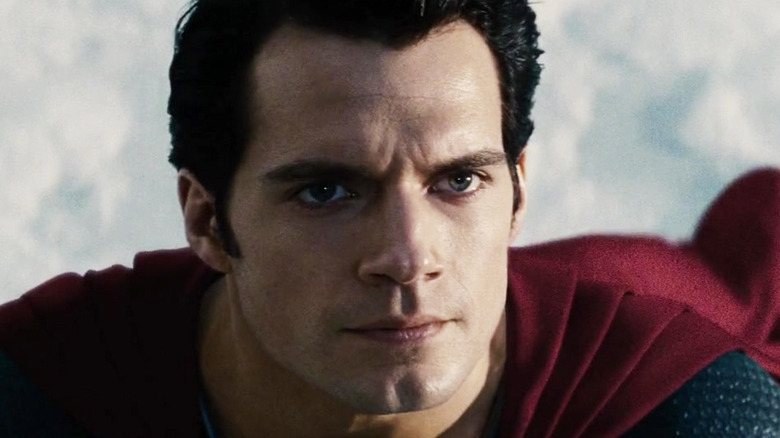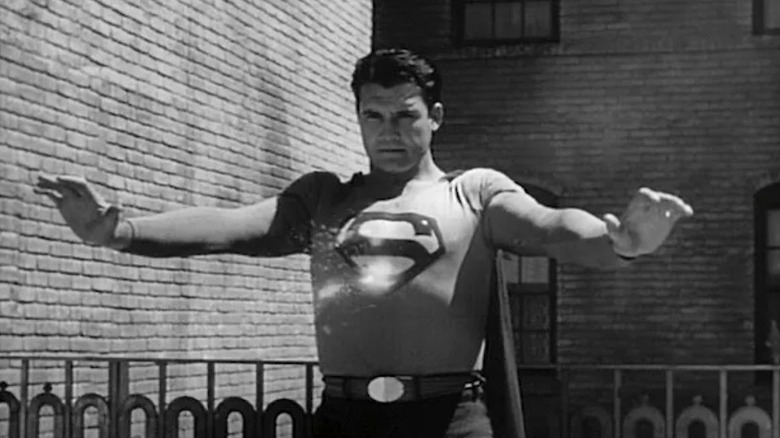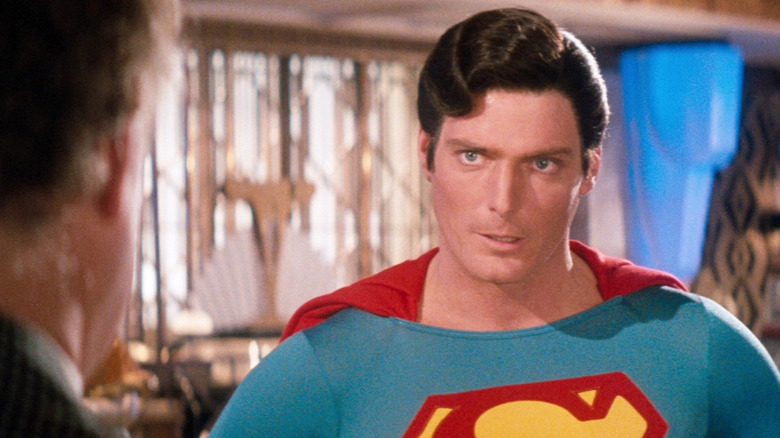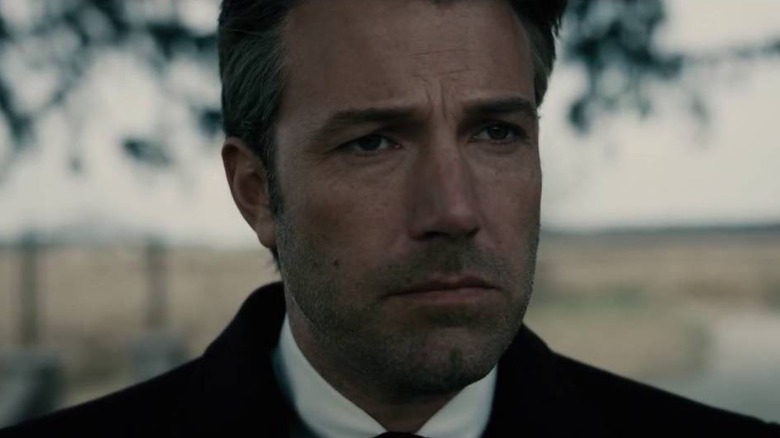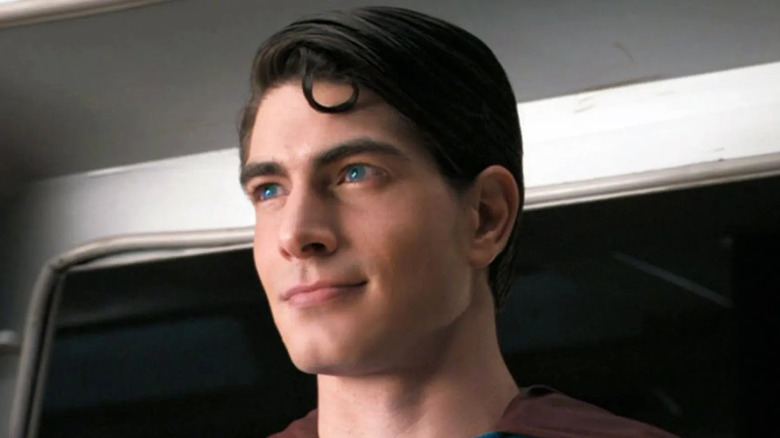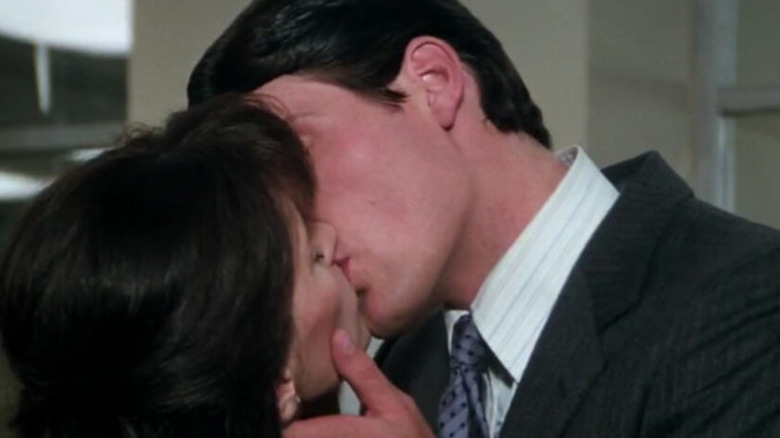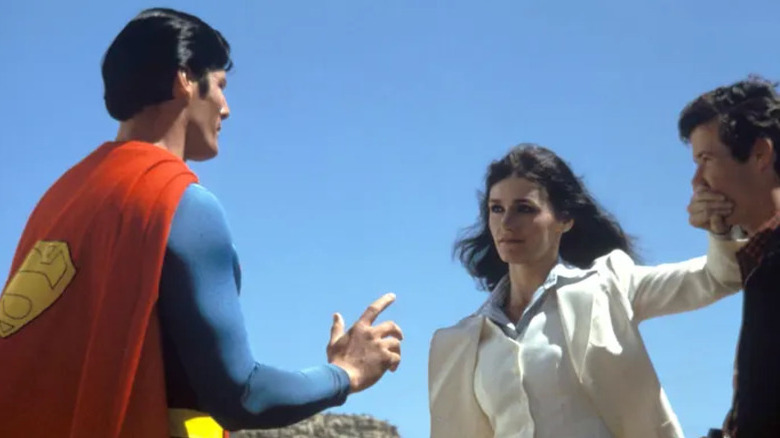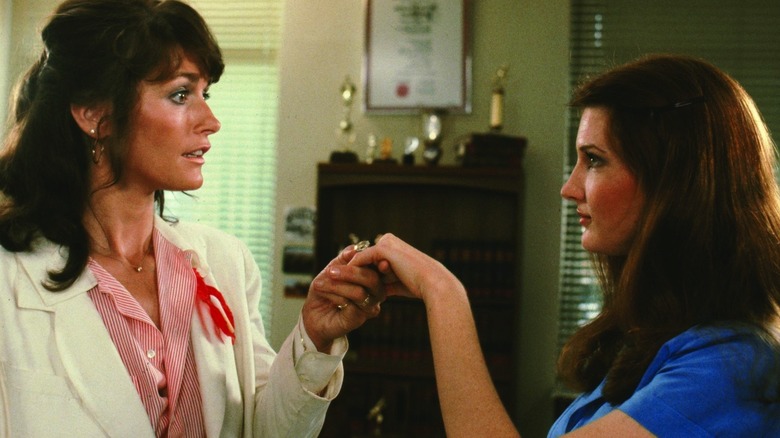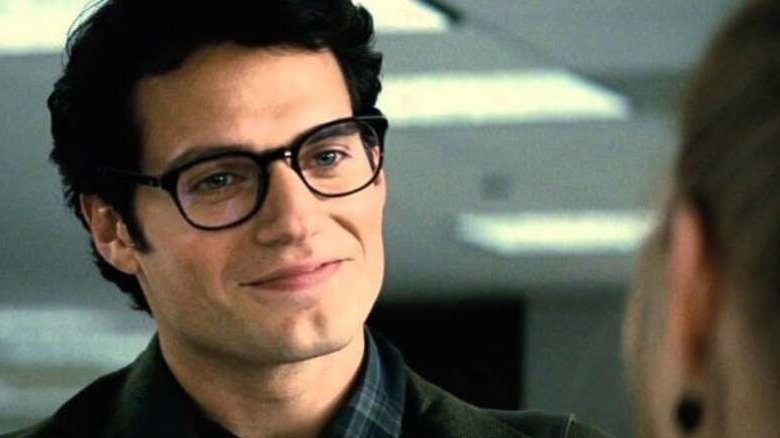Ranking Every Superman Movie's Final Scene Worst To Best
Superman has entertained millions of fans around the world for many years. While he's appeared in everything from video games to comic books, the Man of Steel's feature films are especially beloved. Superman's movie depictions have evolved over the decades, to better reflect modern storytelling sensibilities — but the best of them always make sure to maintain the character's core. A movie's ending sequence can make or break this balance. The best tie up their stories while leaving the audience craving sequels, while the worst derail the entire cinematic experience.
Superman movies' final scenes run the gamut in terms of quality. Some are hokey and frustrating. Some are sweeping and emotionally resonant. Some are simply bland. We're here to take a closer look at all of them, from the character's very first feature film to Henry Cavill's modern outings as the Man of Steel. This is every Superman movie's final scene, ranked from worst to best.
8. Superman and the Mole Men comes to an abrupt close
1951's "Superman and the Mole Men" contains the feature film debut of Superman, and predates the "Adventures of Superman" television series that aired the following year. Here, Clark Kent (George Reeves) and Lois Lane (Phyllis Coates) travel to a small town distinguished by the presence of the world's deepest oil well. But this machine doesn't just find oil — it breaches a community of subterranean humanoids.
Though "Superman and the Mole Men" boasts an intriguingly nuanced message, its 58-minute runtime makes it feel rushed. In the film's final sequence, the Mole Men emerge with a laser weapon and set out to rescue a wounded comrade being held at a local hospital. After stopping hostilities from escalating further, Superman returns the wounded Mole Man to his friends. The Mole Men proceed to descend into their underground home, then destroy the well for good to prevent any future incursions. Superman, Lois, and a few townspeople look on as the drill burns. This ending is interesting, but also incredibly abrupt. Basically, "Superman and the Mole Men" works better if you think of it as an extended television episode, rather than the Man of Steel's feature cinematic debut.
7. Superman IV: The Quest for Peace gives Christopher Reeve a cheap exit
1987's "Superman IV: The Quest for Peace" is a superhero movie with the noblest intentions: Its Man of Steel plays a proactive role in global nuclear disarmament. But it stumbles in its execution. This is never more obvious than in the movie's final moments, in which Superman (Christopher Reeve) implores the world to push for peace in a public press conference, then carts off Lex Luthor (Gene Hackman) and his nephew Lenny (Jon Cryer) to the authorities. No ideals can save this ending from feeling like it's going through the motions in an effort to wrap things up as quickly as possible.
"Superman IV: The Quest for Peace" endured severe cuts to its budget in the midst of production, as actor Jon Cryer detailed to The A.V. Club. This flagging support is apparent in the movie's ending — even Christopher Reeve seems to lack the charisma and energy necessary to make his closing speech's themes hit home. This movie was his final turn as Superman, and should have given him the grand exit he deserved. Instead, it is noticeably running on fumes.
6. Batman v Superman: Dawn of Justice focuses on setting up its sequel
2016's "Batman v Superman: Dawn of Justice" has the distinction of being the only Superman movie to receive a wide theatrical release that ends with the Man of Steel six feet under. After a titanic duel with Batman (Ben Affleck), Superman (Henry Cavill) sacrifices his life to destroy a monster genetically engineered by Lex Luthor (Jesse Eisenberg). In the denouement, Luthor is finally imprisoned for his crimes, while Batman and Wonder Woman (Gal Gadot) attend Clark Kent's Smallville funeral and quietly contemplate what's coming next.
Ending on such a somber note feels tonally appropriate, given the state of the DC Extended Universe when this film hit theaters. It also sets up the following year's "Justice League." This is intriguing, but it also leaves much to be desired. This could have been a completely heartrending closing scene, but it's played a little too seriously within its goofier superhero proceedings to work. Moreover, the final shot of pebbles hovering over Superman's coffin openly communicates that Superman will be back on the big screen, but not in a way that really stokes the fires of anticipation. No one really thinks Superman's dead — he's Superman. Devoting the movie's last moment to setting up "Justice League," rather than tying up the story in a satisfying way, just falls flat.
5. Superman Returns closes on a melancholy note
At the end of 2006's "Superman Returns," the Man of Steel (Brandon Routh) foils Lex Luthor's (Kevin Spacey's) latest plot by hoisting a rapidly expanding Kryptonite continent into outer space. This leaves Superman comatose for much of the movie's moody denouement, which sees the world brace itself to lose its greatest hero — soon after he returned to Earth following a prolonged absence, no less. Luckily, Superman regains consciousness, and quietly recognizes Lois' (Kate Bosworth) son Jason (Tristan Lake Leabu) as his child before reassuring her that he is here to stay for good.
A contemplative and deliberately paced movie, "Superman Returns" refuses to end with explosions or shocking reveals. Superman embracing a new lease on life as a father is an effective callback to "Superman: The Movie," but it keeps things resolutely melancholic, rather than effusive. After such a long period without a single "Superman" movie, "Superman Returns" should have thrown a celebration, rather than a sober and serious meditation on legacy. This ending is unique, but it's just not right.
4. Superman II unveils a questionable new superpower
1980's "Superman II" sees Clark (Christopher Reeve) contemplate just how much he would have to give up in order to embark on a romance with Lois Lane (Margot Kidder). All the while, the villainous Zod (Terence Stamp) attacks the United States. This leads Lois to discover the truth about Superman's secret identity, but the couple eventually realizes their romance is doomed to fail as long as the world needs Superman. The Man of Tomorrow proceeds to deal with the aftermath of Zod and clean up the movie's loose ends ... perhaps a bit too conveniently.
In the theatrical cut of "Superman II," Clark kisses Lois and uses a previously unknown superpower that erases her memories of their romantic history and his superhero secret. He then assures the president he will not abandon him again. While it isn't as cheap as employing time travel to undo messy consequences, this ending still feels like far too easy a fix. The director's cut takes things one step further: Here, Superman wipes out recent events via time travel again.
3. Superman: The Movie blends fatherly wisdom
Among the biggest lessons Jor-El (Marlon Brando) imparts to his son (Christopher Reeve) in 1978's "Superman: The Movie" is to not interfere with the natural course of human history. This is countered in the finale, however, when Superman recalls his human father Jonathan Kent's (Glenn Ford) belief that he arrived on Earth for a reason. How do these conflicting lessons come to a head? Awkwardly.
As Superman works overtime to thwart Luthor's (Gene Hackman) plan, Lois Lane (Margot Kidder) dies of suffocation. Devastated, Superman decides to follow Jonathan's words of wisdom rather than Jor-El's: He flies so quickly around the Earth that he travels several minutes back in time. This allows Superman to save Lois' life and apprehend Luthor and his assistant, who are quickly turned over to the authorities. Though this pivotal moment solidifies the importance of Superman's human upbringing, it also relies on an overpowered deus ex machina to produce a too-clean happy ending.
2. Superman III takes an intriguing new path
Though 1983's "Superman III" is a tonally uneven movie, its ending is fairly strong. After dealing with unscrupulous businessman Ross Webster (Robert Vaughn) and his unwilling associate Gus Gorman (Richard Pryor), Clark (Christopher Reeve) welcomes his childhood sweetheart Lana Lang (Annette O'Toole) to Metropolis as a new co-worker. Once he reunites with Lois (Margot Kidder), who's been on an extended vacation, Superman sets out to right the wrongs his dark half committed.
"Superman III" is, for the most part, a strange film with only occasional moments of greatness. But its ending is straight-up strong, and provides an interesting direction for future installments to take with Lana's relocation. Though this direction isn't actually followed up on in its sequel, "Superman III" still stands out — especially since it doesn't resort to the sort of too-easy tricks its predecessors employ. Moreover, though the rest of the movie is full of distractingly bad jokes, "Superman III" ends on an appropriately sedate note. It might not be the best Superman movie, but its ending stands out as one of the series' strongest.
1. Man of Steel officially welcomes Superman to the planet
While "Man of Steel" begins with explosive action and climaxes with General Zod's (Michael Shannon) devastating attack on Metropolis, this 2013 film ends on a decidedly hopeful note. After speaking with his mother Martha Kent (Diane Kent) about his decision to become an investigative reporter, Clark (Henry Cavill) joins the Daily Planet staff as it resumes normal activity. New co-worker Lois Lane (Amy Adams), already aware of Clark's double life and extraterrestrial origins, is more than happy to welcome him to the planet and the Planet.
For all the doom and gloom that reverberates through this film's big set pieces, its ending is centered around the hope that Superman represents. The added narrative wrinkle of Lois knowing Clark's secret dispenses with the usual superheroic chicanery, allowing them to carry out their romance in full. "Man of Steel" may have divided critics upon release, but its ending scene is undeniably strong.
